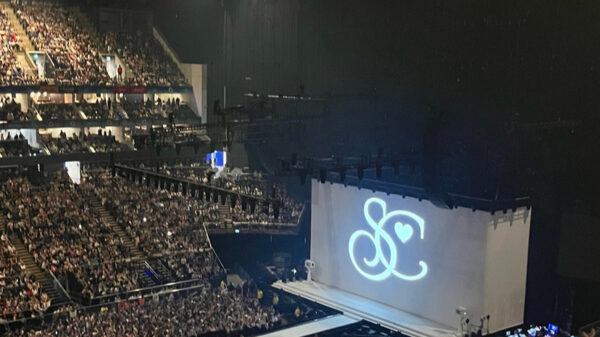Writer Holly Anderson interviews the renowned composer Ros Gilman, discussing his methods, awards, and composing for the short film ‘The Last Cloudweaver’.
Ros Gilman is an award-winning composer, producer, conductor and violinist with an amazingly diverse range of work. One of his most recent scores, for the highly praised short film ‘The Last Cloudweaver’, has just been nominated for its ninth award in a beautiful display of the composer’s ongoing success.
Roar: Hi, welcome! I’ve seen quite a few people ask you this in your interviews but I was wondering if, for the readers of Roar News, you could quickly give an overview of how you got into film composition?
Gilman: Of course. So, I come from a family of musicians, both my parents are musicians, my mum is a violinist, and my dad is also a composer and I started my musical journey at the age of 3. I started taking lessons in violin and I was originally trained as a concert violinist and went on to study this as well at the University of Music in Vienna. Unfortunately, just before my bachelor’s I had an injury so I had to give up playing the violin which was quite a painful experience.
Roar: Must have been difficult.
Gilman: Certainly, but I have always loved film, even as a teenager I got to spend a lot of time going to the cinema and watching films. I also wrote, you know, improvised and wrote little pieces on the side, never professionally though. After these injuries, you can’t perform but you can still compose and conduct and so these were the two things I eventually decided to do. So, I reapplied for uni and went back into formal education initially in Vienna, I came back to the University of Music in composition and later film composition as well and also got a scholarship to go to the Royal College of Music as an exchange programme. So, that was the start of the journey as a film composer.
Roar: Wow. I also wanted to ask, as I study film music myself, what was scoring for a short film like, especially considering the lack of dialogue and the fact that it is a continuous score? How is this different to say when you were doing the episode work on Folklore? What are the main differences there?
Gilman: So, with ‘The Last Cloudweaver’, it doesn’t have any dialogue, like you rightly mentioned, the music becomes quite central in telling the story. So that was really about finding the approach to replace the non-existing dialogue within music. And the way we did this, so, the film has two main characters, you might have seen, there’s a dragon and a young girl, and the dragon is trying to teach the young girl the art of cloudweaving. Each of the characters received their own instrument and their own theme as well: the Dragon had a more sung, grand theme which was mainly performed by a cello and the girl who was a bit more impatient and much younger, she has a more nostalgic theme and it’s got ornaments in the melody, expressing her playfulness as well and it was mainly played by the piccolo flute.
In ‘Folklore’, an HBO original horror series, we actually had a central theme for the character and Billy Christian, the director of ‘Grandma’s Kiss’, the episode that I worked on, wanted a violin or a cello-centric score and being a former concert violinist myself that was great for me to score, so we assigned the main character to a violin. Of course, these are very different, one is fantasy, and one is horror.
Roar: I was going to also ask you about this as you have a very broad range of genres that you are covering in your work, but you have said previously that your dream would be to score a Pixar film? I was wondering if you could expand further on what draws you to animation out of everything that you have done?
Gilman: Yes, that is absolutely correct! Yes, so, as a film composer, I think flexibility is a great asset and I enjoy working in different genres: I’ve worked on drama, on horror, on romantic comedies, but also on fantasy and animation. And these two genres are the ones that I enjoy very much, creating these fantasy worlds and music is often, I feel, quite central to these animated films and you’ll be aware of the great scores that have come out of the Pixar or Disney films which I personally, very much enjoy. So, on one side I’d say it’s creating these often magical worlds, and on the other side it’s the role that I feel music plays in animated films which I feel can be more central to the story telling.
Roar: I was thinking a lot, when I was listening to your scores, about the instrumentation, especially considering the idea of ‘mysticism’, as with Johanne, I thought it was very cleverly done. Obviously, you have used for ‘The Last Cloudweaver’, quite a conventional orchestral set-up, a huge one, a 65-piece orchestra, but I was wondering if this is quite a key thing to your style or if for your upcoming projects, like ‘The Entertainer’ and ‘VANILLA’, will we see something different happen?
Gilman: Yes, so first of all, thanks for doing this very thorough research, that’s very impressive. So, with Anna, the director of ‘Johanne’ and ‘The Last Cloudweaver’, she really enjoys this big orchestral score which, since then under the two projects, one even more ambitious than ‘The Last Cloudweaver’, coming out next year, recorded with a large orchestra, again in Macedonia. But as a classically-trained composer and a former violinist, I very much enjoy working with the colours of the orchestra. That said, ‘VANILLA’, a film by Joseph A. Adesunloye, which had its first industry screening in Locarno in August this year, that was a very intimate solo piano score. And, ‘The Entertainer’, a film by David Clay Diaz who is an Austrian film award nominee and a very gnarly first feature nominee, that is also a much more intimate score which is sort of in its early stage at the moment and is also just a solo instrument. It really is about discovering the director’s vision and finding the right language for the film, so it might be a big 65-piece symphony orchestra, but a different story and a different director’s vision might be better served with a very intimate, small approach.
Roar: Interesting. I was also wondering if you had any views on how someone should compose: do you compose in a more traditional sense, sat at a piano, closely related to the instrument that your playing, working with paper and pencil? Or do you work with forms of electronic production, and do you consider there to be any differences in outcome?
Gilman: Good question. I think that there is a time and place for either. So, very often, much of my work, just because there is not a lot of time often, I go directly into the DAW (Digital Audio Workstation) to produce digital mock-ups initially and to send them to the director for approval and to show them ideas. That’s one approach that is certainly, absolutely, common place in the industry today, so of course everybody wants demos, and everybody makes demos, and whether there is the budget at the end to record with our musicians or not, that is a different matter. But, if there is time, like there was, for example, with ‘The Last Cloudweaver’, we had the cellist and the music was supposed to be recorded quite early on in the film production process. And that fell into, even though the film was only released last year, the music production fell into times when covid restrictions were selective so we had to have the recording session and it was a challenge. So, yeah, I could remember taking some time and having a visual approach, literally with pen and paper and it can be very much beneficial from a certain perspective. So, I think, ideally, it is to combine these two, if there is the time that is great. In reality, more often than not, so most often, there might not be a time to sit down and compose with pen and paper.
Roar: Thank you, I just wanted to ask, you have received a lot of nominations and awards for ‘The Last Cloudweaver’, which is completely appropriate in my opinion, and you also have your youtube channel in which you discuss the conventions of composing, as a successful composer, what would be one piece of advise that you would have for someone that is interested in film composition?
Gilman: Thanks for watching the videos, first of all. I would probably say that mastering the art of writing music and producing music are essential, so really studying the master’s and what the great composers have done is quite important. I would also probably say the business aspect of the film industry is an important one as well. So, the film industry, it’s a business, I would say studying the basics of the business aspects of film is quite an important part of an artist’s education in general. So, I, for example, after my masters, I assisted another composer for a few years and then went back to study business which has proved quite well. So, for any artist, unless you are employed and you just do your craft and what you have learnt, the study of business, at least the basics can be quite beneficial.
Roar: Thank you so much, and for my last question, which I was recently asked in my composition class, what is one film score that you wished that you had composed?
Gilman: Well, I would probably say something by Disney or Pixar because I really enjoy their films. I couldn’t pinpoint one particular score because there are so many wonderful films and wonderful scores. I could perhaps name a few composers that I really admire, one of them, I’m sure you’re aware of, John Powell, who wrote the score for ‘How to Train Your Dragon’, or ‘Shrek’, or ‘The Borne Trilogy’ and Nicholas Britell, another great composer, Ludwig Göransson who did ‘Oppenheimer’ is another great example of a great composer, so I think, yeah, it is hard to pin down one score but I quite enjoyed working on the films that I have worked on.
Conclusion
With evidence of success spanning from the Moondance International Film Festival to nominations at the Jerry Goldsmith Awards, his works reaching over 12 million streams across Spotify, Apple Music and Pandora, Roar was delighted to have such an amazing insight into the process and inspiration of Ros Gilman’s pieces. Check out more of Gilman’s work across his youtube and instagram, his website here, and don’t forget to see The Last Cloudweaver!
















